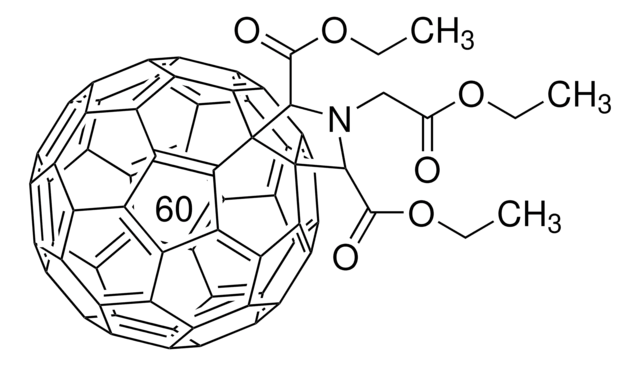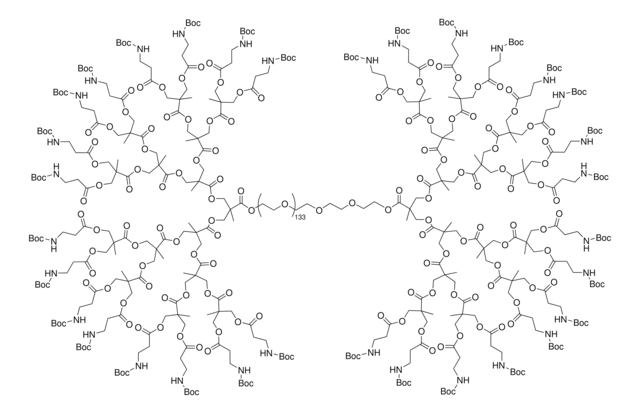802832
4-(1′,5′-Dihydro-1′-methyl-2′H-[5,6]fullereno-C60-Ih-[1,9-c]pyrrol-2′-yl)benzoic acid
Sinónimos:
C60-SAM
Iniciar sesiónpara Ver la Fijación de precios por contrato y de la organización
About This Item
Fórmula empírica (notación de Hill):
C70H11NO2
Número de CAS:
Peso molecular:
897.84
UNSPSC Code:
12352103
NACRES:
NA.23
Productos recomendados
¿Está buscando productos similares? Visita Guía de comparación de productos
General description
4-(1′,5′-Dihydro-1′-methyl-2′H-[5,6]fullereno-C60-Ih-[1,9-c]pyrrol-2′-yl)benzoic acid (C60-SAM) is a fullerene based self-assembled monolayer that can be used to functionalize the oxide surface for the formation electron selective layer (ECL). It can act as a good electron donor with a high electron affinity. It enhances the overall efficiency of perovskite solar cells (PSCs) by reducing the hysteresis.
Application
Fullerene-based self-assembled monolayers for use in organic electronic devices such as inverted polymer solar cells and perovskite−polymer hybrid solar cells.
Storage Class
11 - Combustible Solids
wgk_germany
WGK 3
flash_point_f
Not applicable
flash_point_c
Not applicable
Elija entre una de las versiones más recientes:
¿Ya tiene este producto?
Encuentre la documentación para los productos que ha comprado recientemente en la Biblioteca de documentos.
Los clientes también vieron
Interfacial modification to improve inverted polymer solar cells
Hau SK, et al.
Journal of Materials Chemistry, 18(42), 5113-5119 (2008)
Analysis of the hysteresis behavior of perovskite solar cells with interfacial fullerene self-assembled monolayers
Valles-Pelarda M, et al.
The Journal of Physical Chemistry Letters, 7(22), 4622-4628 (2016)
Effect of Chemical Modification of Fullerene-Based Self-Assembled Monolayers on the Performance of Inverted Polymer Solar Cells
Hau et al.
ACS Applied Materials & Interfaces, 2(7), 1892-1902 (2010)
Agnese Abrusci et al.
Nano letters, 13(7), 3124-3128 (2013-06-19)
A plethora of solution-processed materials have been developed for solar cell applications. Hybrid solar cells based on light absorbing semiconducting polymers infiltrated into mesoporous TiO2 are an interesting concept, but generating charge at the polymer-metal oxide heterojunction is challenging. Metal-organic
Highly Efficient Inverted Organic Solar Cells Through Material and Interfacial Engineering of Indacenodithieno[3: 2-b]thiophene-Based Polymers and Devices
Jeremy JI, et al.
Advances in Functional Materials, 24(10), 1465-1473 (2014)
Nuestro equipo de científicos tiene experiencia en todas las áreas de investigación: Ciencias de la vida, Ciencia de los materiales, Síntesis química, Cromatografía, Analítica y muchas otras.
Póngase en contacto con el Servicio técnico


![[6,6]-Phenyl C61 butyric acid methyl ester ≥99%](/deepweb/assets/sigmaaldrich/product/structures/359/221/d990c746-0960-4c69-bf76-fe09b193824d/640/d990c746-0960-4c69-bf76-fe09b193824d.png)





![[6,6]-Phenyl C71 butyric acid methyl ester 99%](/deepweb/assets/sigmaaldrich/product/structures/716/624/9fb9f2f0-ae99-429f-8d3a-b12267976a4d/640/9fb9f2f0-ae99-429f-8d3a-b12267976a4d.png)
